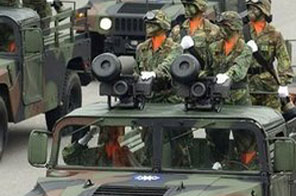China protests US arms sales
WASHINGTON: The United States approved 6.4 billion dollars in weapons for Taiwan to help counter China's growing military, angering the rising Asian giant which warned of "serious" consequences.
The arms package includes Patriot missiles, Black Hawk helicopters, and communications equipment for Taiwan's F-16 fleet. But it did not include new fighter aircraft themselves, which had been part of Taipei's wish list.
China considers Taiwan, where nationalists fled in 1949 after losing the mainland's civil war, to be a territory awaiting reunification, by force if necessary. It had warned Washington repeatedly against the arms sales.
Chinese Vice Foreign Minister He Yafei made an urgent official protest to the US ambassador in Beijing, Jon Huntsman, early Saturday local time, Wang Baodong, spokesman for the Chinese embassy in Washington, told AFP.
China "strongly urges the US side to fully recognise the gravity of the issue, revoke the erroneous decision on arms sales to Taiwan and stop selling any weapons to Taiwan," he said.
The sale marks the most divisive act toward China by President Barack Obama, whose first year was devoted to broadening ties with Beijing despite discord on areas such as trade, human rights, Internet censorship and climate change.
"This is a clear demonstration of the commitment that this administration has to provide Taiwan the defensive weapons it needs," State Department spokesman Philip Crowley said Friday.
The United States since 1979 has recognized Beijing as China's sole government. But Congress at the same time required the United States to sell Taiwan weapons for its self-defense.
"We think that this action is consistent with the US one-China policy... and contributes to maintaining security and stability across the Taiwan Strait," he said.
A spokesman for the Chinese embassy in Washington said Beijing sent an urgent protest in the early hours Saturday Beijing time and also made its displeasure known when US officials spoke to a Chinese diplomat to unveil the decision.
The sale "constitutes a gross intervention into China's internal affairs, seriously endangers China's national security and harms China's peaceful reunification efforts," spokesman Wang Baodong quoted the demarche as saying.
"The US plan will definitely undermine China-US relations and bring about serious negative impact on exchange and cooperation in major areas between the two countries," he added.
The last US arms package for Taiwan, announced under previous president George W. Bush in October 2008, led China to snap off military relations with the United States temporarily.
Analysts said China this time could retaliate by refusing to support sanctions on Iran, a key US priority. Secretary of State Hillary Clinton appealed to Beijing on Iran's nuclear program in remarks in Paris hours before the Taiwan sale was announced.
Some believe that China could also try a new approach by retaliating against individual companies that sell weapons to Taiwan.
Bonnie Glaser, a senior fellow at the Center for Strategic and International Studies, said China was increasingly sensitive about its security after major protests last year in Tibet and Xinjiang.
"I also think there is a sense in China that they are emerging as a power and not to put up with decisions that have been made by the US in the past," she said.
Obama's national security advisor, former general James Jones, said moments before the announcement that the United States was being "transparent" with China.
"But we are bent towards a new relationship with China as a rising power in the world, with influence on a variety of issues that go beyond the arms sales," he said, calling China a "very, very high priority" for the Obama administration.
A senior US official, speaking on condition of anonymity, said that while the United States expected the strong reaction from China, it was hopeful that Obama's early diplomacy would prevent a serious deterioration in relations.
The official added that the sale met an "urgent requirement" for Taiwan but also gave the leadership "greater confidence and ability to interact across the straits in a peaceful dialogue" with Beijing.
Taiwan's President Ma Ying-jeou has worked to improve relations with Beijing. His election in 2008 ended two decades of leadership in Taiwan that took a more confrontational approach with China.
But Ma has nonetheless appealed to the United States for weapons including the F-16 fighter jets in light of China's military budget, which is shooting up by double digit percentages each year.
Officials denied they balked at the sale of F-16s to temper China's reaction, saying deliberations were ongoing.
The anonymous senior official said that the Taiwan sale would also send a powerful signal to other Asian nations "that the US stands by its commitments."
"Others that depend on the United States for the maintenance of peace and stability can be reassured that our support is unwavering," he said.
The United States stations troops in South Korea and Japan, whose new government has butted heads with Washington over a controversial air force base.






